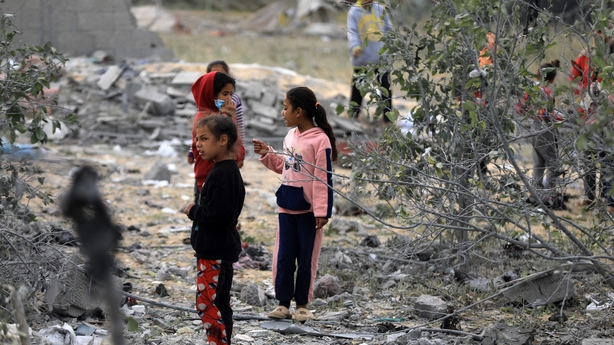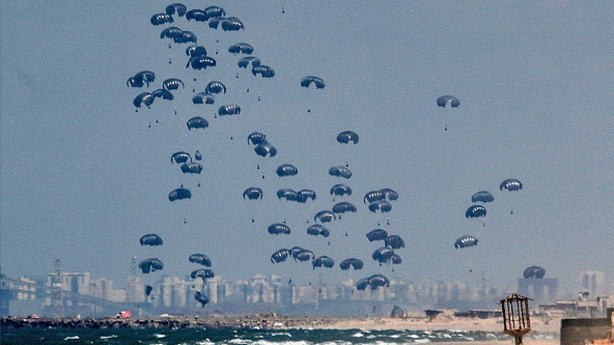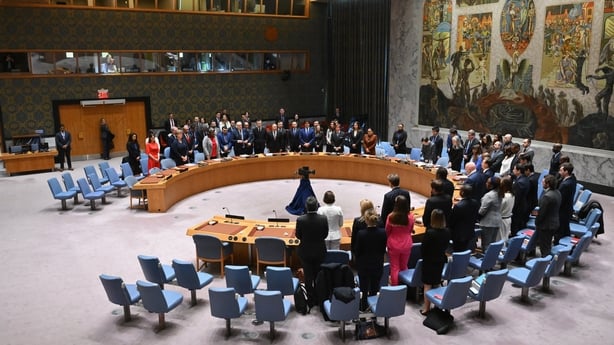A United Nations expert has told the global body's Human Rights Council that she believed that Israel's military campaign in Gaza since 7 October amounted to genocide and called on countries to immediately impose sanctions and an arms embargo.
Israel, which did not attend the session, rejected her findings.
"It is my solemn duty to report on the worst of what humanity is capable of and to present my findings," Francesca Albanese, the UN Special Rapporteur on human rights in the Occupied Territories, told the UN rights body in Geneva, presenting a report called "The Anatomy of a Genocide".
"I find that there are reasonable grounds to believe that the threshold indicating the commission of the crime of genocide against Palestinians as a group in Gaza has been met," she said, citing more than 30,000 Palestinians killed among other acts.
"I implore member states to abide by their obligations, which start with imposing an arms embargo and sanctions on Israel and so ensure that the future does not continue to repeat itself," she said, prompting a burst of applause.
The 1948 Genocide Convention, enacted in the wake of the mass murder of Jews in the Nazi Holocaust, defines genocide as "acts committed with intent to destroy, in whole or in part, a national, ethnical, racial or religious group".
Israel's diplomatic mission in Geneva said the use of the word genocide was "outrageous" and said the war was against Islamist group Hamas and not Palestinian civilians.
It was triggered when Hamas fighters stormed into southern Israel, killing 1,200 and taking 253 hostages, by Israeli tallies.
"Instead of seeking the truth, this Special Rapporteur tries to fit weak arguments to her distorted and obscene inversion of reality," it said.
Gulf nations such as Qatar, as well as African countries including Algeria and Mauritania, voiced support for Ms Albanese's findings and alarm at the humanitarian situation.
The seats for Israel's ally the United States were left empty. Washington has previously accused the council of a chronic anti-Israel bias.
Albanese, an Italian lawyer, is one of dozens of independent human rights experts mandated by the United Nations to report and advise on specific themes and crises. Her views do not reflect those of the global body as a whole.
In the past, her comments on the Israel-Hamas conflict have drawn scrutiny, including from a US ambassador in Geneva who said she has a history of using "antisemitic tropes".

Earlier, Israeli tanks and armoured vehicles surrounded a hospital in Gaza's Khan Yunis, witnesses said, as the Palestinian Red Crescent reported another facility was "out of service" due to military operations.
Witnesses at Nasser Hospital, where thousands of displaced Palestinians have sought refuge from the fighting, told AFP that shots were fired at the sprawling complex in the southern city of Khan Yunis, but no raid was as yet taking place.
Gaza's Hamas-run health ministry said Israeli troops were shooting and firing "shells and (conducting) violent raids in its surroundings in preparation for its storming".
"Thousands of displaced people are still inside the hospital," the ministry said. "They do not have sufficient quantities of drinking water, food and infant formula, and their lives are in danger."
The Israeli army did not immediately respond to an AFP request for comment.
For the past nine days, Israeli troops have been involved in heavy fighting in and around Gaza City's Al-Shifa Hospital, the territory's biggest. They claim to have killed 170 Palestinian militants there and arrested hundreds of others.
'Horrific' scenes
The Palestinian Red Crescent said that Al-Amal Hospital, near Nasser in Khan Yunis, was "out of service" after Israeli forces evacuated it and blocked the entrance.
The medical organisation said in a statement that "the international community failed to provide the necessary protection" for staff, patients and displaced Gazans sheltering at Al-Amal.
The Red Crescent said one patient and one of its volunteers were killed on Sunday by Israeli fire.
The Israeli military, which yesterday reported killing about 20 fighters around Al-Amal Hospital, did not comment on the Red Crescent's statement.
An Irish doctor who has worked in Gaza for decades has described "horrific" scenes at the Al-Aqsa Hospital which he visited a few weeks ago.
Speaking on RTÉ's Drivetime, Professor Nick Maynard of Medical Aid for Palestinians said that the most of the injuries he witnessed were caused by blasts to the abdomens and chests of women and children.
Children frequently presented with severe burns or having lost several limbs, he said.
"One memory which will haunt me until the day I die was that of an eight year old girl," Prof Maynard said. "Her burns were so severe, we knew she wouldn't survive. The burns of her face were so bad that you could see the bones of her face through the burnt flesh".

US will continue aid drops into Gaza, says White House
The United States will continue dropping essential aid from the air into Gaza, the White House has said after Hamas called for the aid drops to end following fatal drownings and stampedes.
"Air drops are one of the many ways that we are helping to provide desperately-needed aid to Palestinians in Gaza, and we will continue to do so," a spokesman for the National Security Council told reporters.
Jordanian, US and other planes have airdropped food into Gaza, even as UN officials and aid agencies have warned this falls far short of the dire needs of Gaza's 2.4 million people and is far less effective than ensuring overland access.
Today, as Jordanian, Egyptian, Emirati and German planes again airdropped relief goods, with the sight of food packages floating down on parachutes sending Palestinian crowds rushing toward them.
Six people were killed in stampedes and 12 others drowned off the territory's Mediterranean coast, Gaza's government and the Swiss-based Euro-Med Human Rights Monitor said.
In a statement, Hamas called for "an immediate end to airdrop operations" and "the immediate and rapid opening of land crossings to allow humanitarian aid to reach our Palestinian people".
The UN children's fund, UNICEF, said vastly more aid must be rushed into Gaza by road, rather than air or sea, to avert "this imminent famine".
Food aid is usually only airdropped in crises where "people are cut off for hundreds of kilometres", said UNICEF spokesman James Elder, speaking via video link from Gaza.
However, "the lifesaving aid they need is a matter of kilometres away", he said, as trucks loaded with aid have been waiting across Gaza's southern border with Egypt.
"We need to use the road networks."

UN ceasefire vote
Israeli troops meanwhile battled Hamas with no sign of a let-up in the war raging for almost six months.
The Israeli military claimed its jets had struck more than 60 targets, including tunnels and buildings "in which armed terrorists were identified".
The health ministry in Gaza said 70 people were killed early today, 13 of them in air strikes around the southern city of Rafah.
The Security Council resolution passed yesterday demanded a ceasefire for the ongoing Muslim holy month of Ramadan that should lead to a "lasting" truce.
Israel's top ally the United States, which had blocked previous resolutions, abstained amid growing concern for the worsening humanitarian situation, sparking an angry reaction from Israel.
The US has baulked at Israeli Prime Minister Benjamin Netanyahu's determination to launch an invasion of Rafah.
The southern city is Gaza's last major population centre still untouched by Israeli ground troops, and where most of Gaza's population has sought refuge.
Israel charged that the UN resolution "hurts" both its war effort and attempts to free hostages, though the White House insisted there had been no shift in its policy.
Palestinians in Rafah welcomed the UN vote and called on the US to ensure the resolution is implemented.
Bilal Awad, 63, said the US must "stand against an attack on Rafah, and support the return of the displaced to their cities" further north in Gaza.
Has the US abandoned Israel at the United Nations?
Blinken raises concerns on Rafah offensive with Israel
'Political isolation'
Hamas welcomed the UN resolution and reaffirmed its readiness to negotiate the release of hostages in exchange for Palestinian prisoners held by Israel.
Hamas leader Ismail Haniyeh, during a visit to Iran today, said Israel is experiencing "unprecedented political isolation" and losing US "protection" at the Security Council.
In an earlier statement, Hamas had blamed Israel for the failure to make progress in the latest round of talks hosted by mediator Qatar.
Hamas argued Mr Netanyahu and his cabinet were "entirely responsible for the failure of negotiation efforts and for preventing an agreement from being reached up until now".
Mr Netanyahu's office hit back on social media platform X, charging that Hamas was "not interested in continuing negotiations".
Qatari foreign ministry spokesperson Majed al-Ansari said the talks were "ongoing", adding there had been no "development that would lead to thinking that one of the teams has pulled out of the negotiations".

